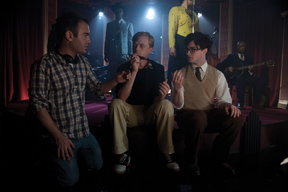
The Beat Generation — a collection of writers that questioned contemporary practices in the 1940s and included the likes of Allen Ginsberg and Jack Kerouac — is the primary driving force for the new drama “Kill Your Darlings” and the project’s director, John Krokidas, is just as radical as the Beat Generation itself.
The film follows a young Allen Ginsberg, played by “Harry Potter” star Daniel Radcliffe, as he leaves his provincial past for the bright lights of New York City and Columbia University.
The cast is a who’s who of the Beat Generation’s writers with a silver screen treatment of Jack Kerouac (Jack Huston), William S. Burroughs (Ben Foster) and Lucien Carr (Dane DeHaan) as well.
“The Beat Generation really wanted to stir things up,” Krokidas said from his Dallas hotel digs.
“These guys weren’t happy with how they saw the world and were active and engaged to change it. They challenged anything that came in front of them.”
Krokidas began writing the movie in college with his writing partner Austin Bunn.
The two were first-year roommates at Yale University at the time.
“I’ve always had a fascination with the Beat Generation but I wanted to make sure to tell a story that didn’t just rely on its time period, but told an honest coming-of-age tale as well,” Krokidas said.
Bunn and Krokidas managed to insert some of their collegiate memories in the play, with one scene acting as a confession of sort for a prank they played while at Yale.
“College is a big coming-of-age thing for anyone,” Krokidas said.
“It certainly was for Ginsberg.”
As director, Krokidas made certain that his vision came off the page and into frame.
However, he wanted to do something a little different. He wanted to make a noir.
“It was the craziest pitch ever,” Krokidas said.
“We said to our producer: ‘We want to make a noir film about the Beat Generation.’ And because of how great they are, we got the movie made.”
In the world of “Kill Your Darlings,” the college-aged youth is inquisitive, challenging and relentless.
In today’s hyper-connected world, one asks: Could something like the Beat Generation ever happen again?
“I just don’t see anything like that happening,” Krokidas said.
“Social action is a lot easier to bring attention to. The Beat Generation was out there really fighting for what they believed in and challenging the ideas of generation’s passed. It was all an incredible, exciting time.”
Krokidas’s “Kill Your Darlings” will be featured at the Angelika Theater Friday.








